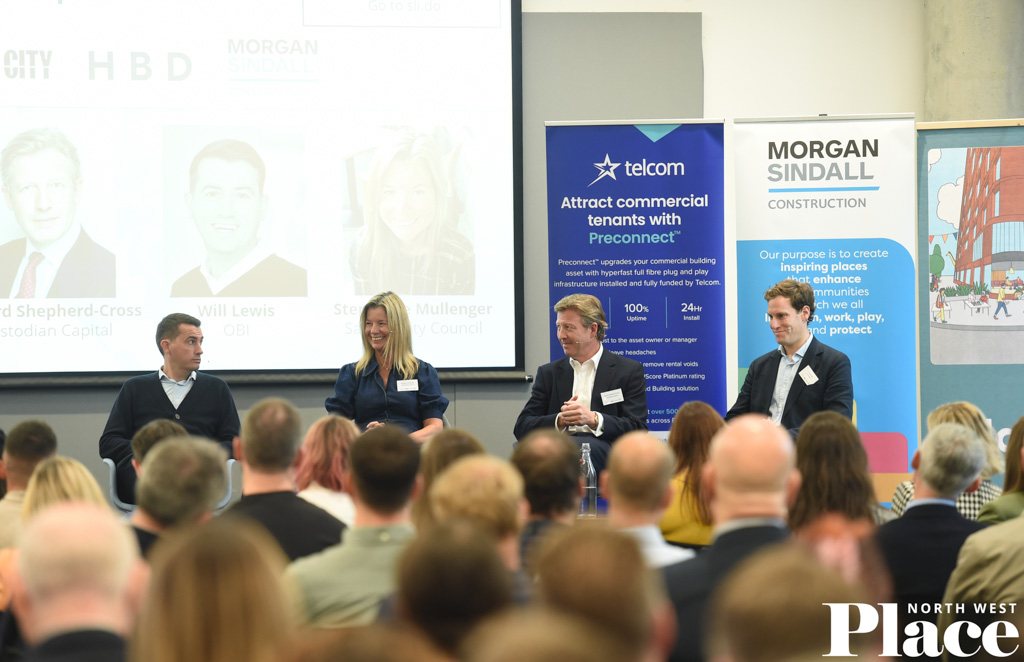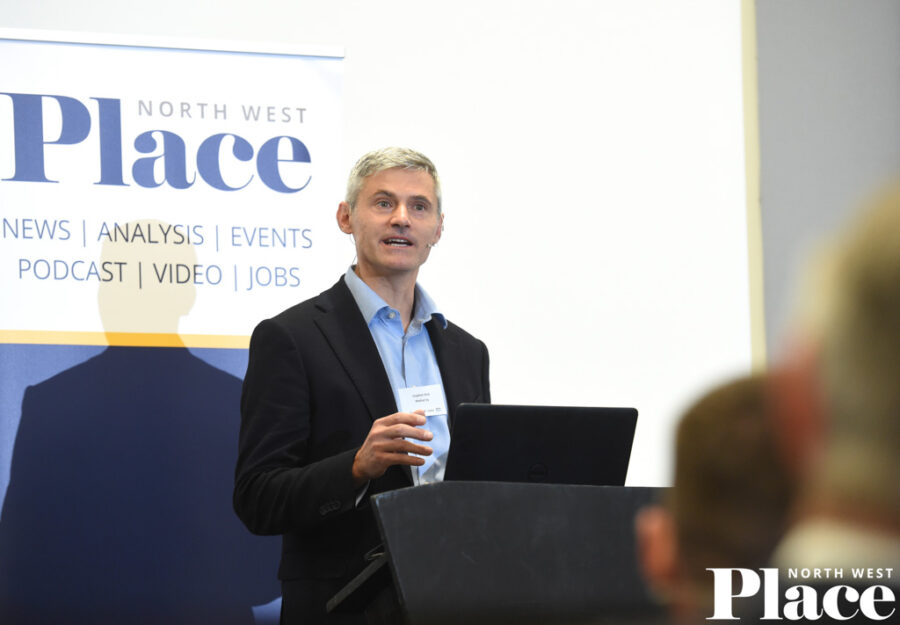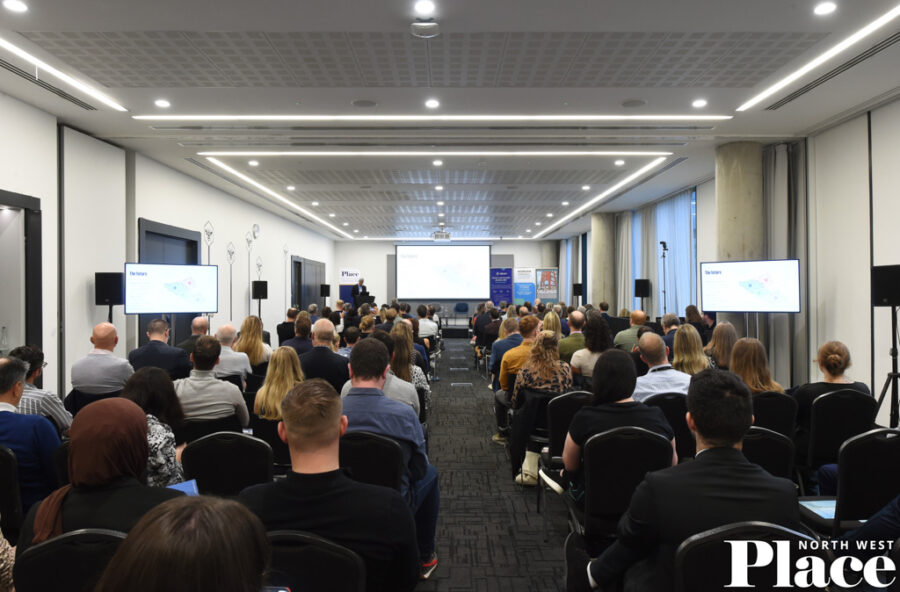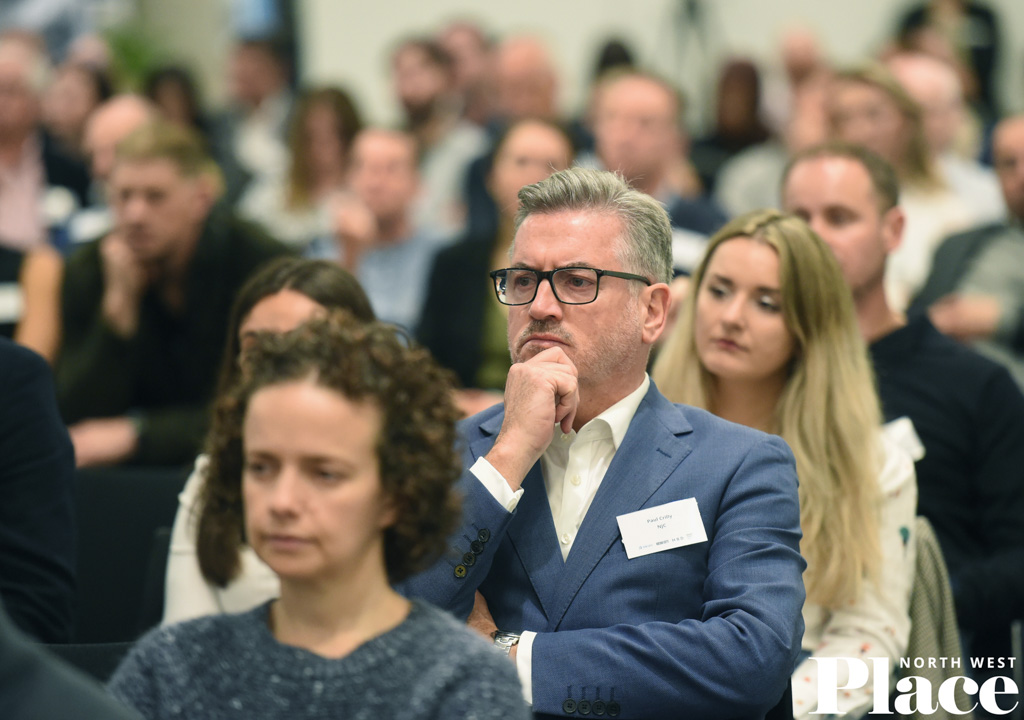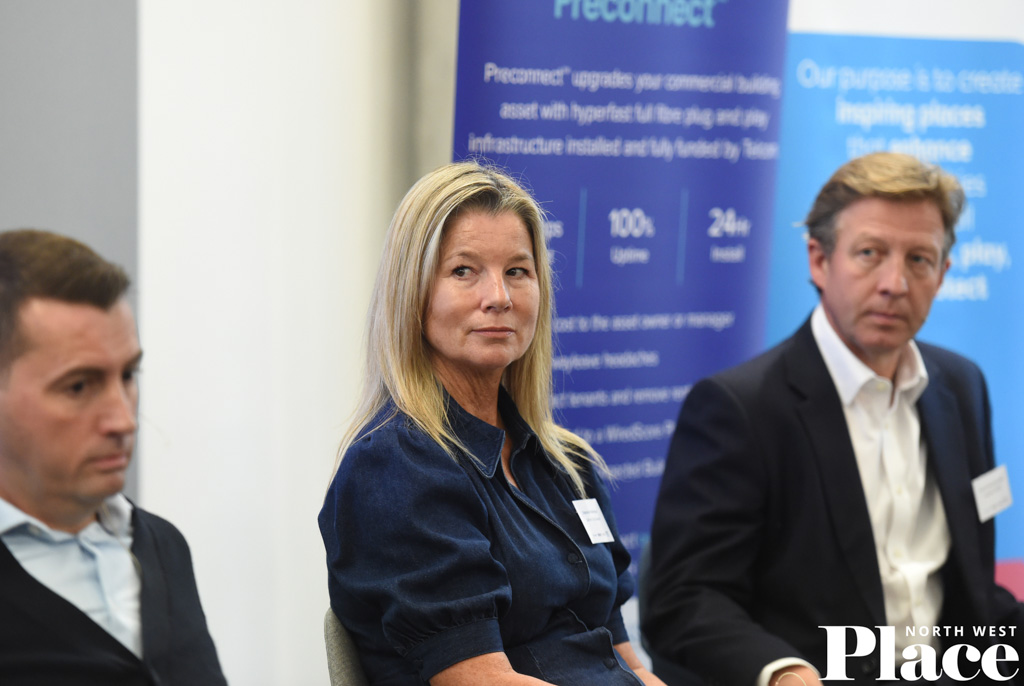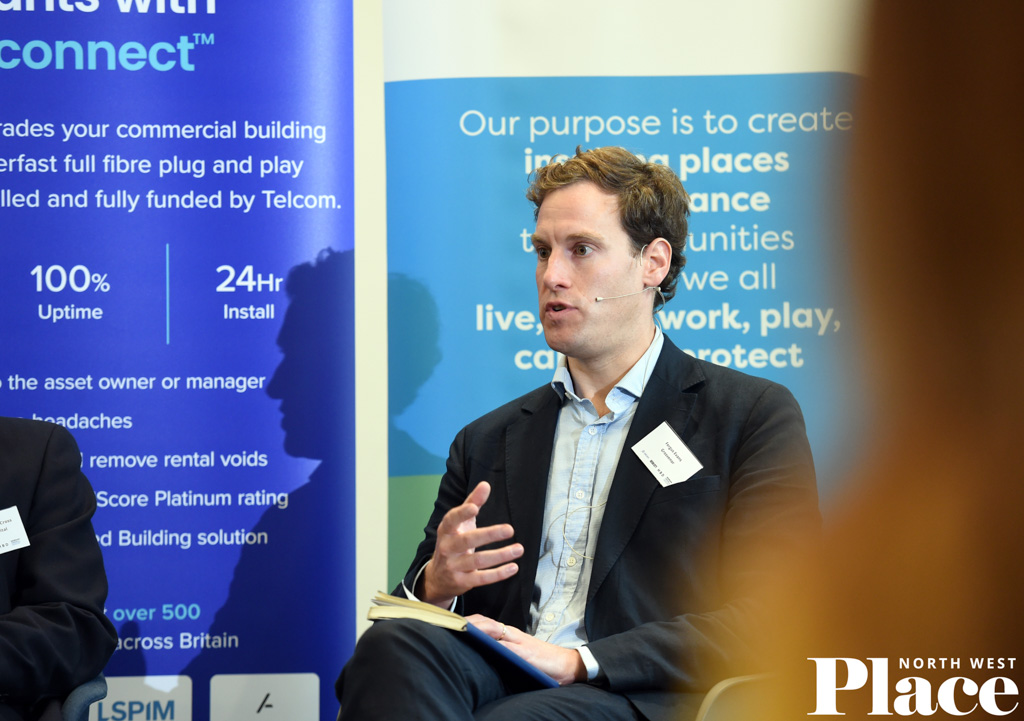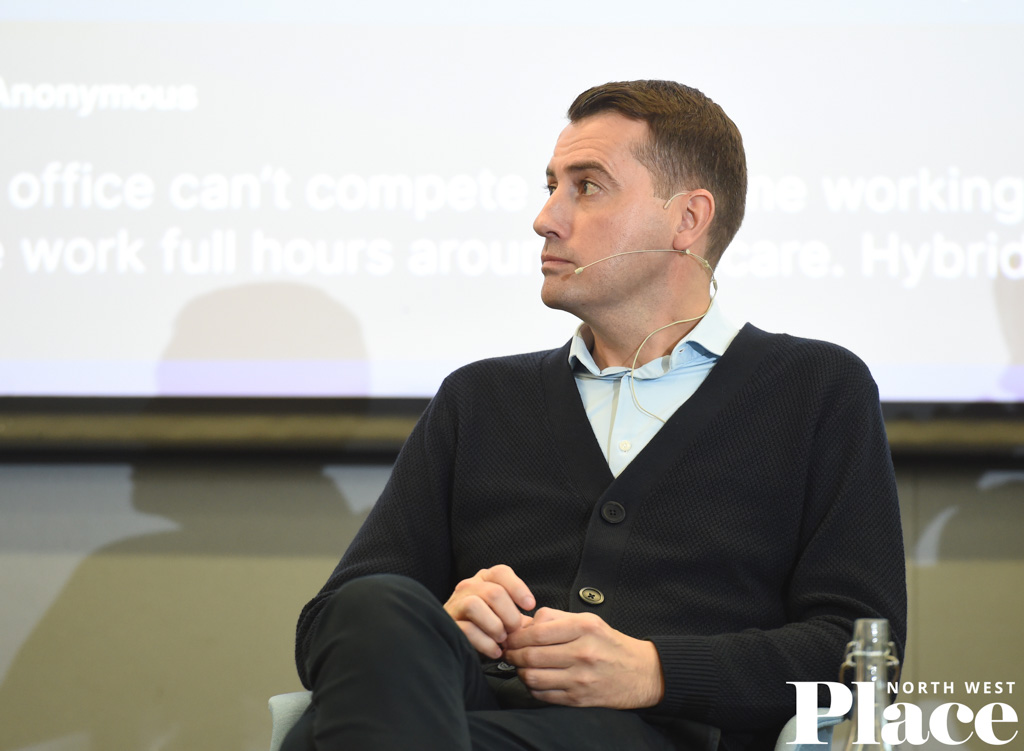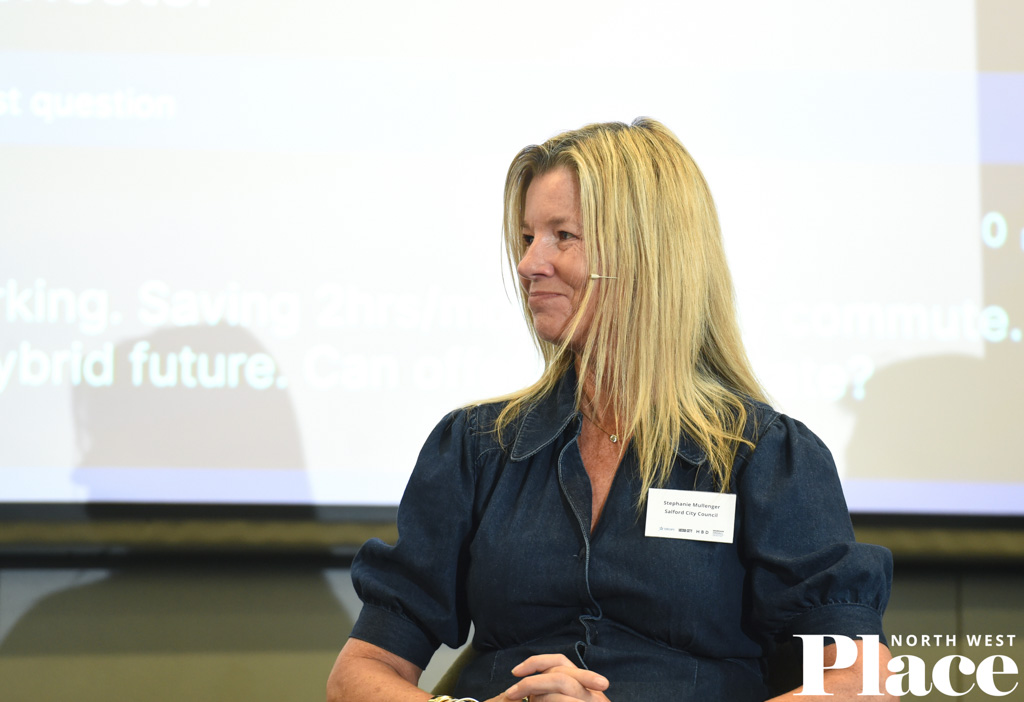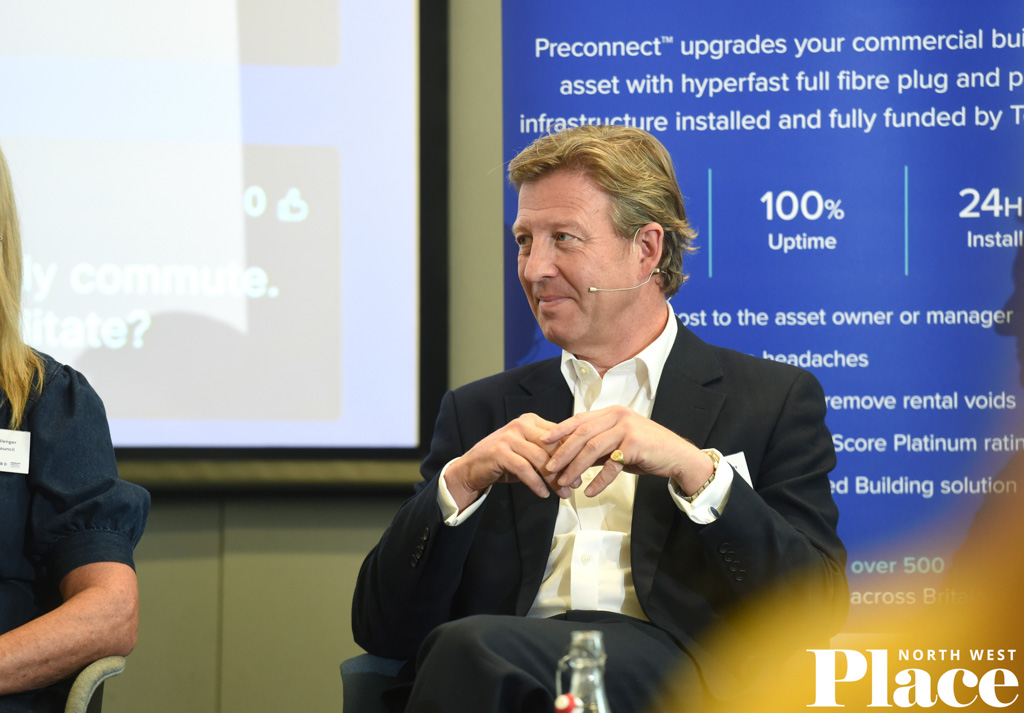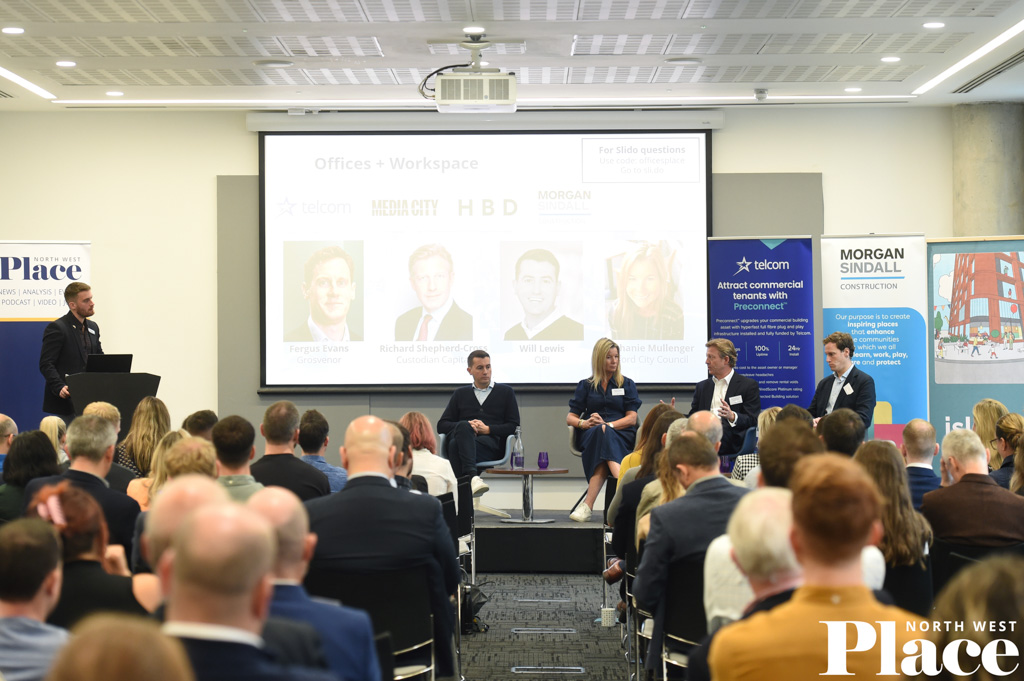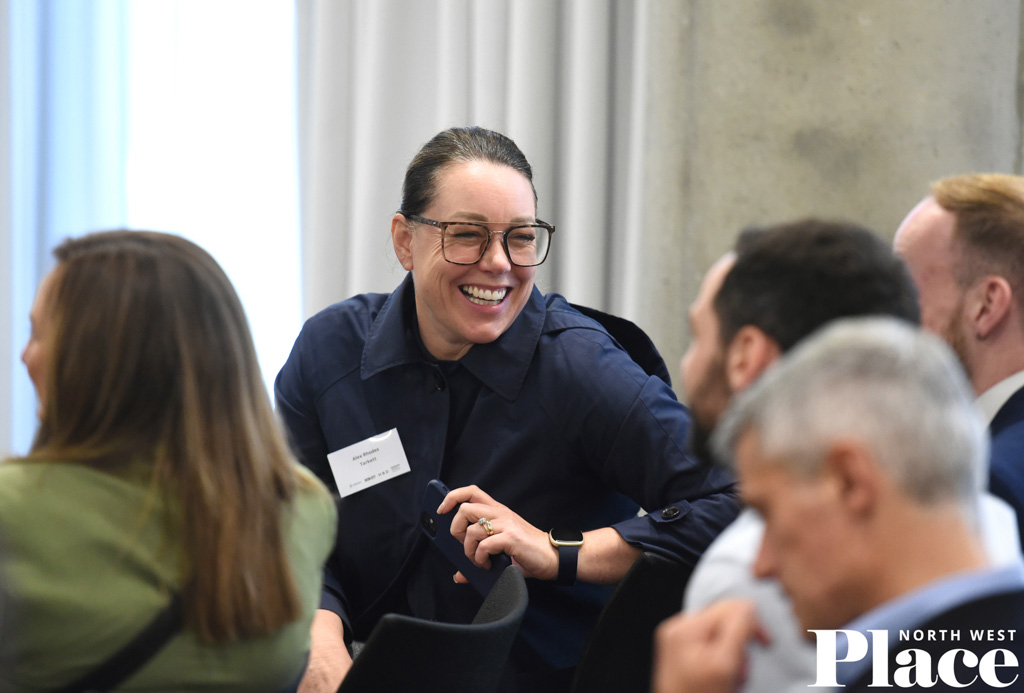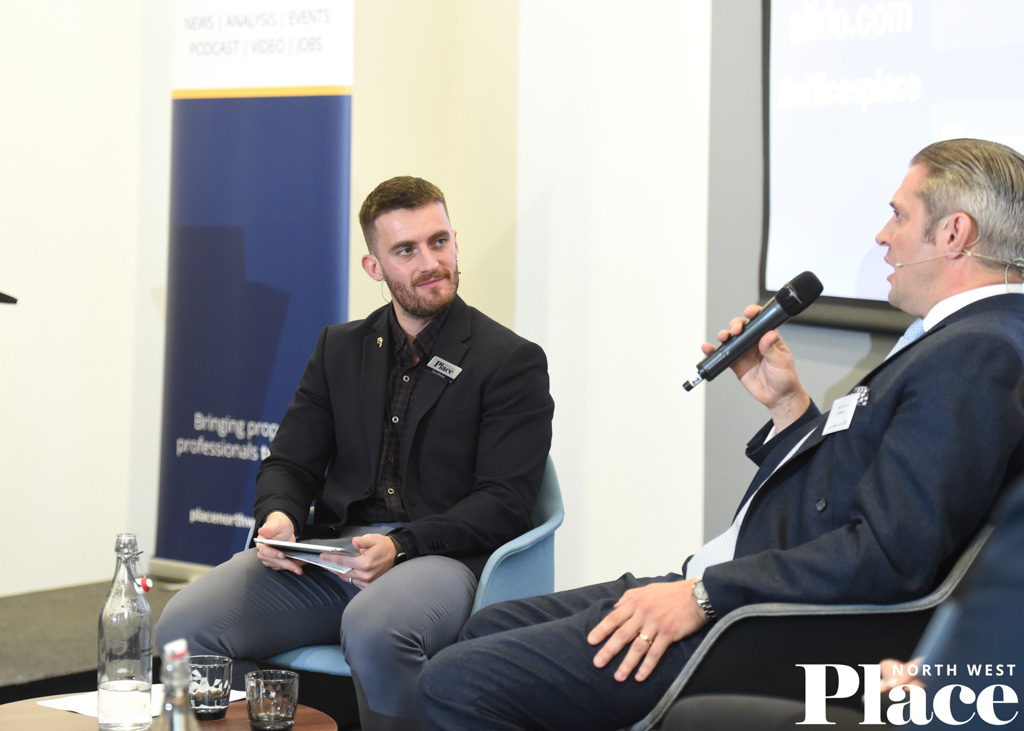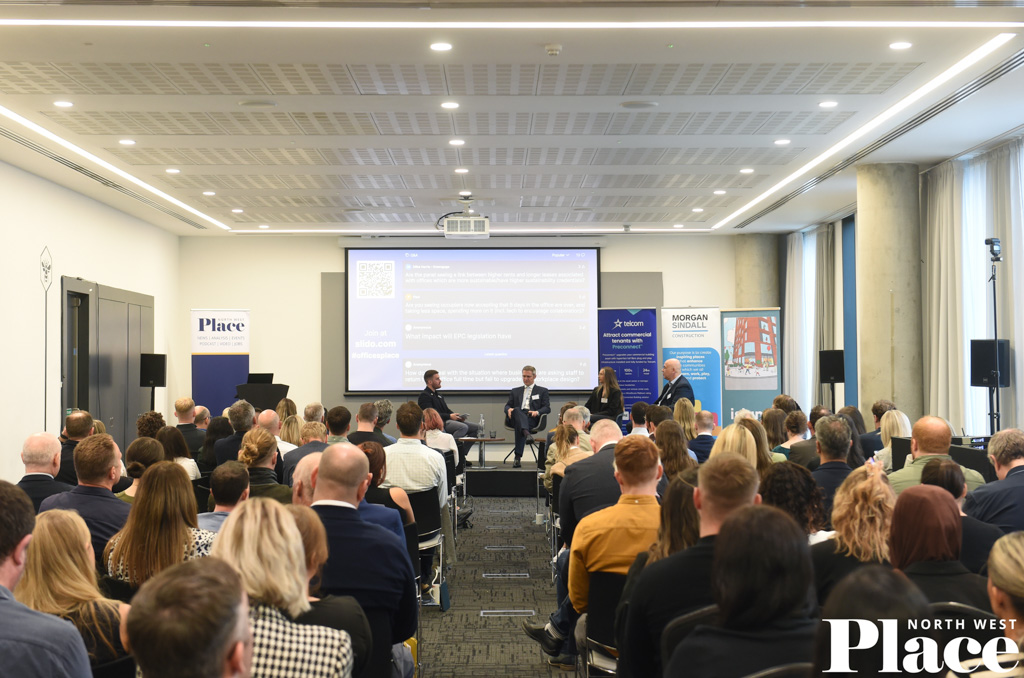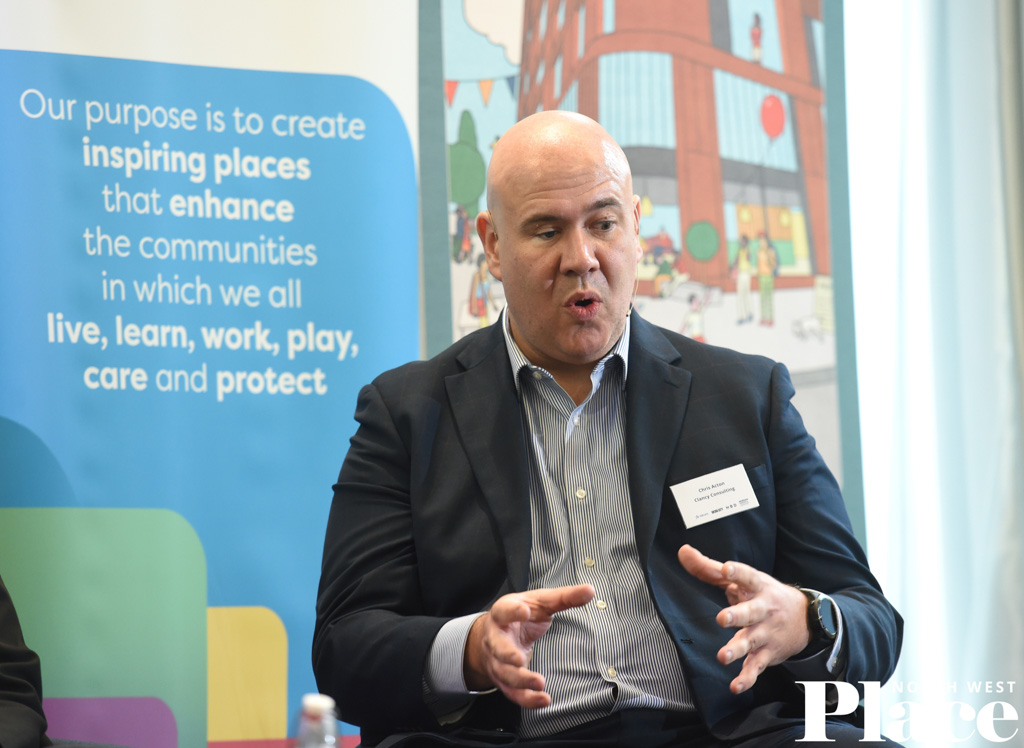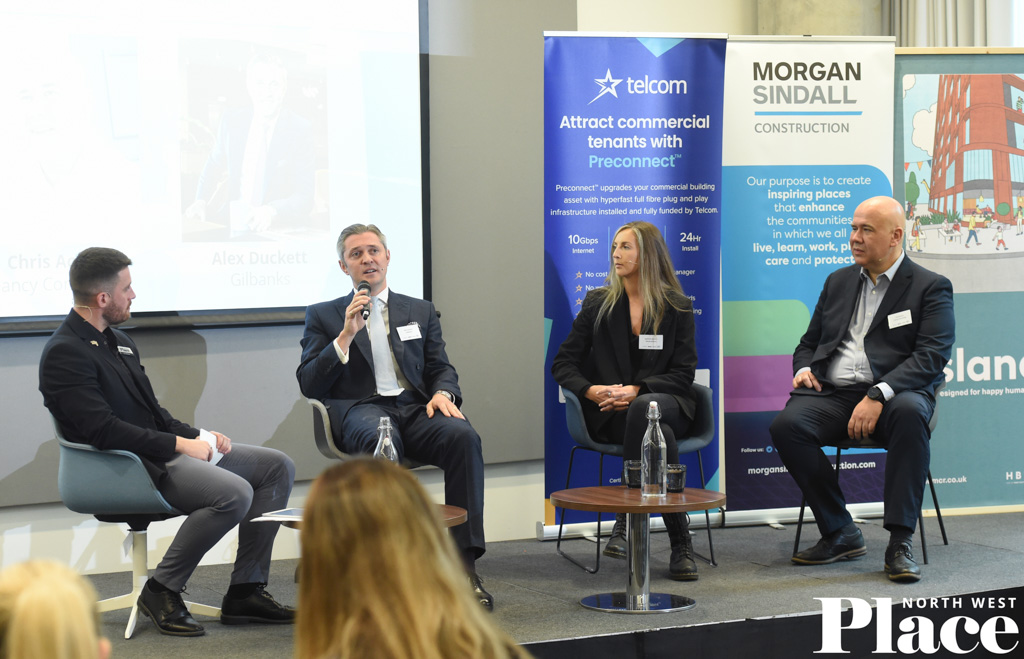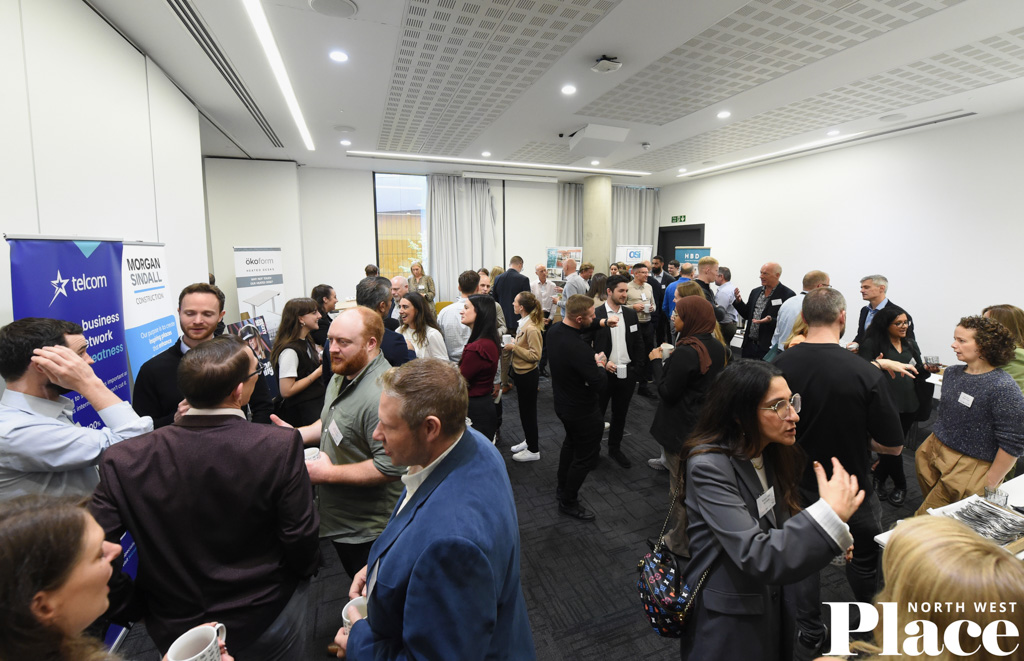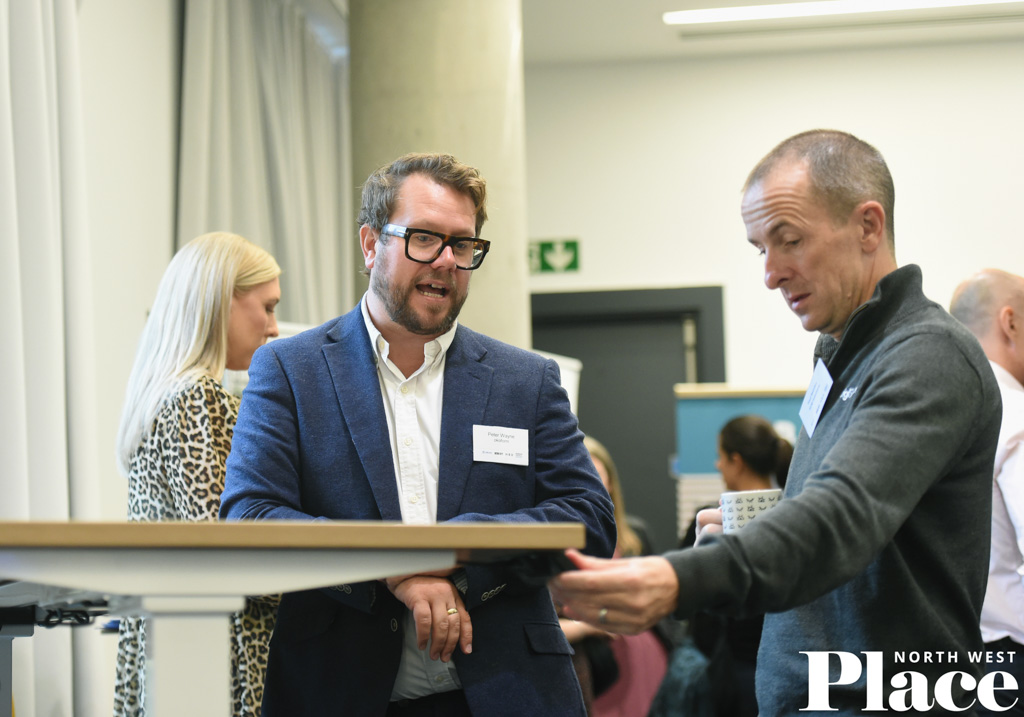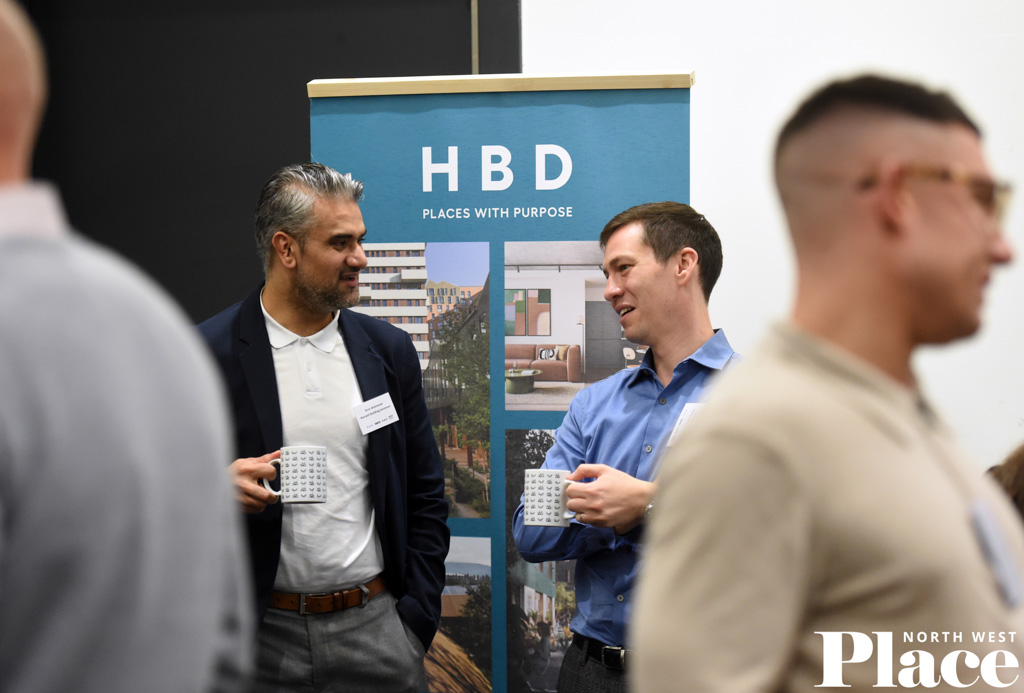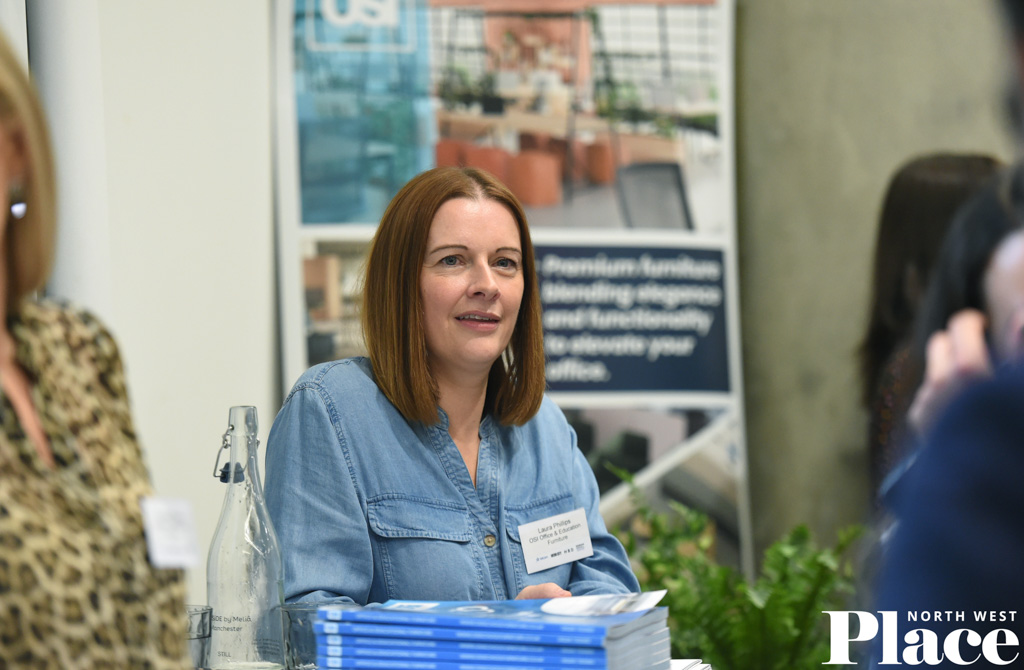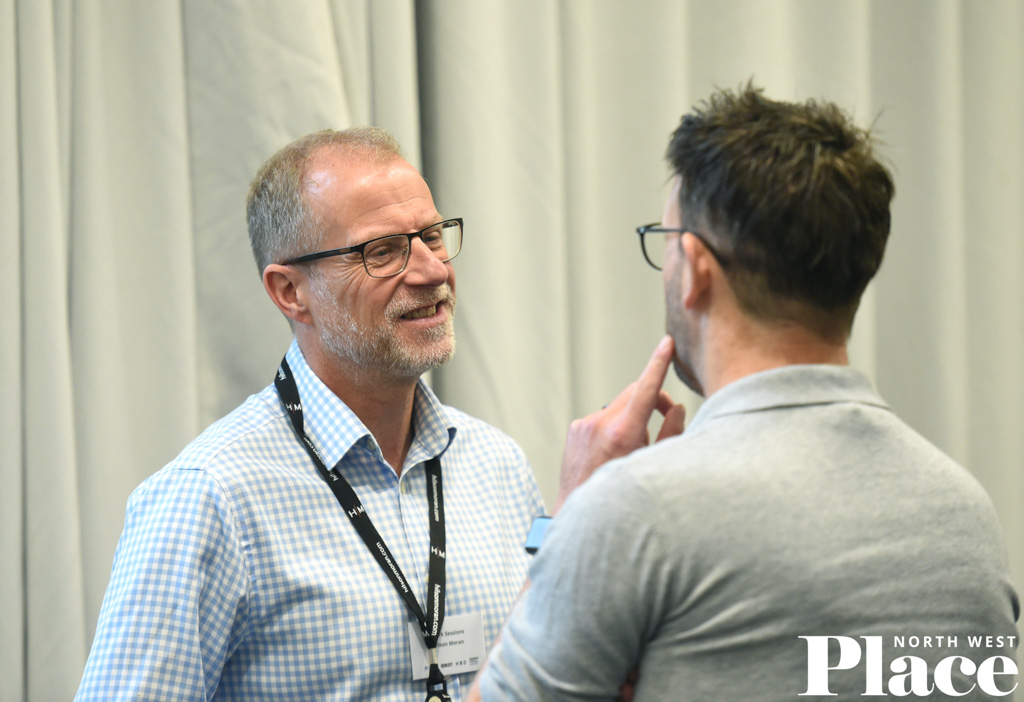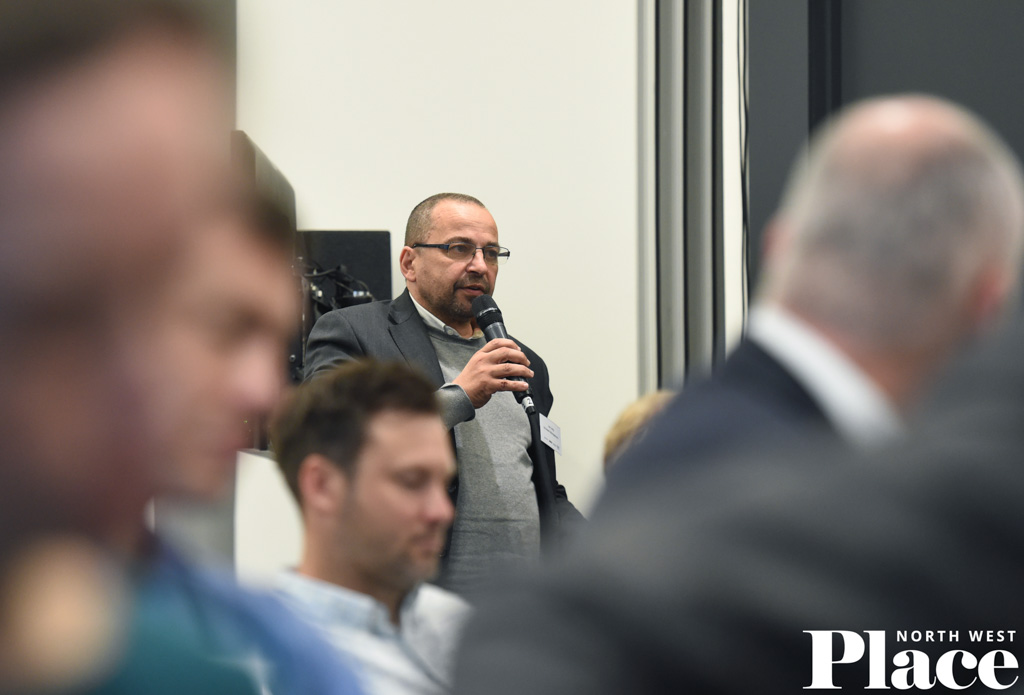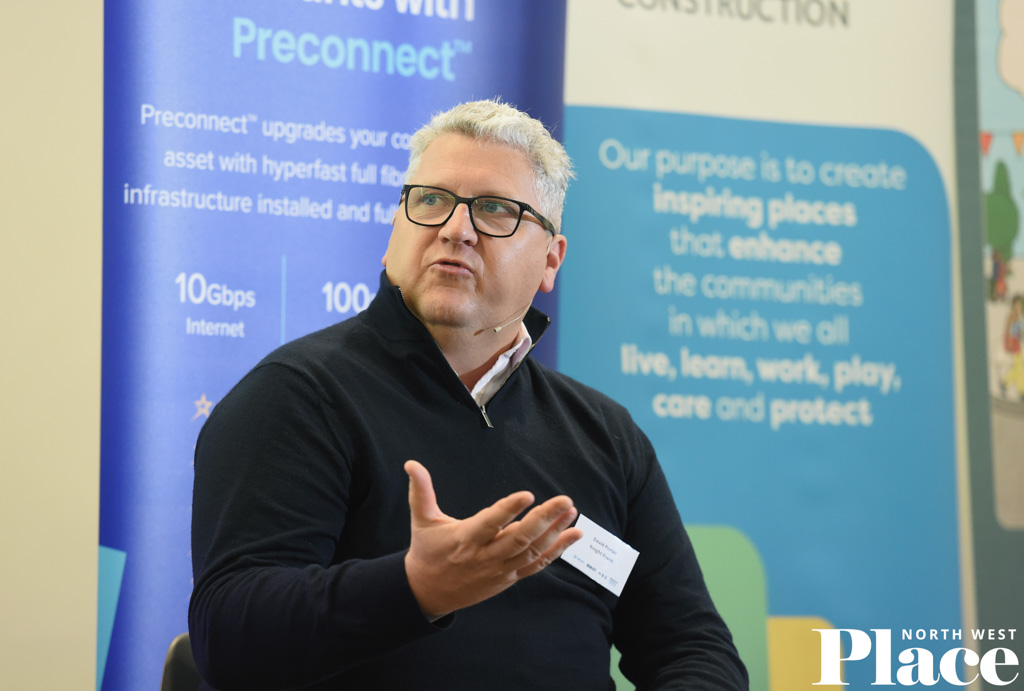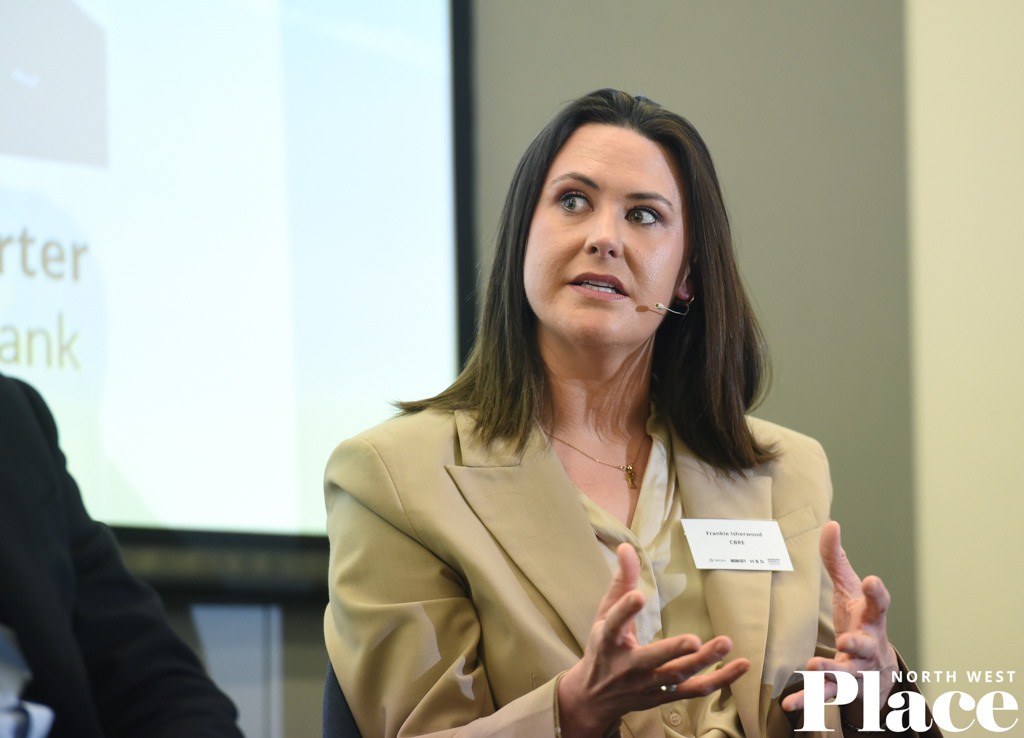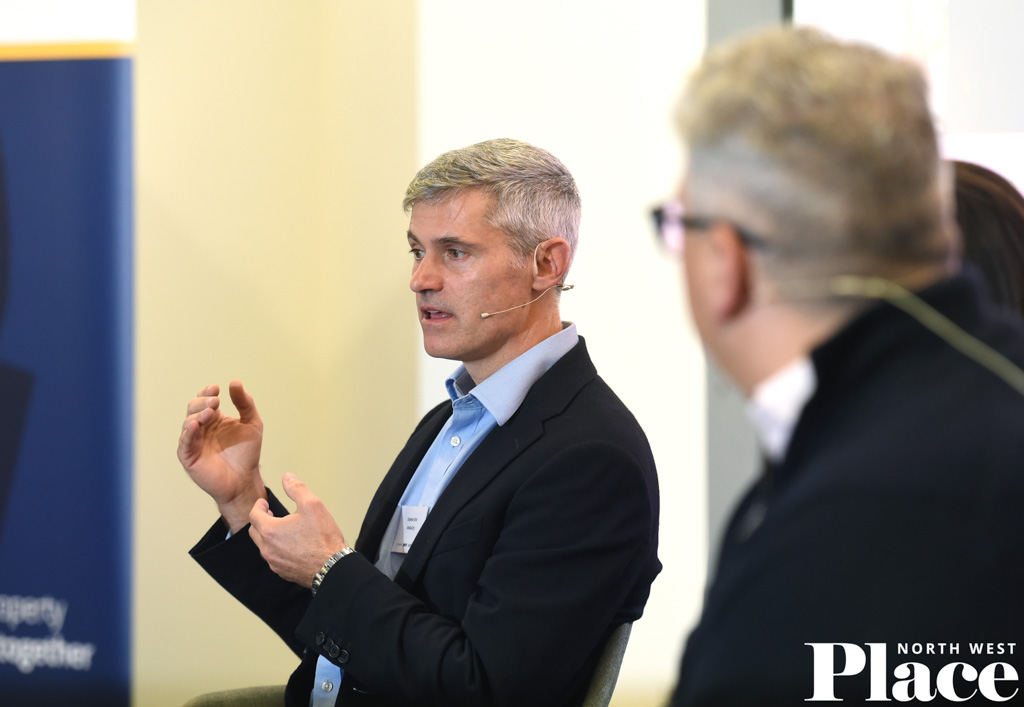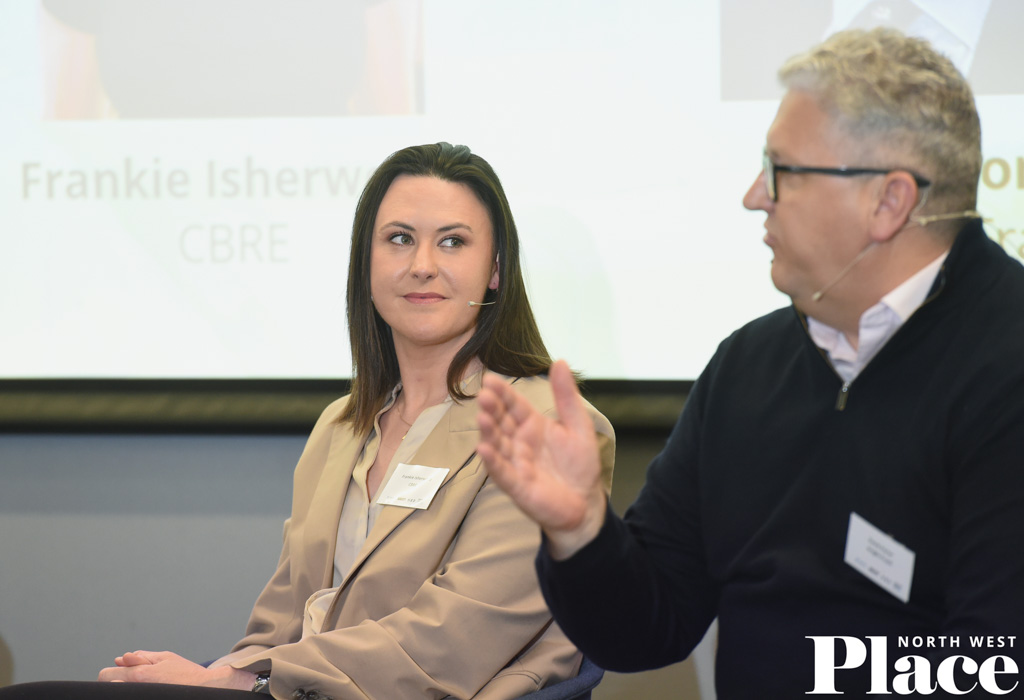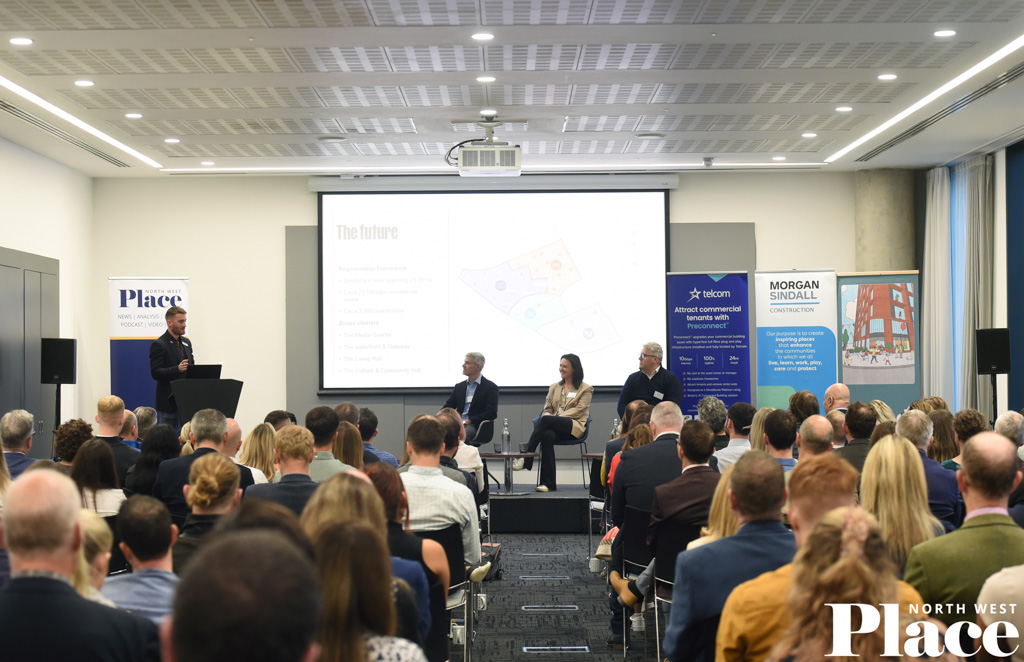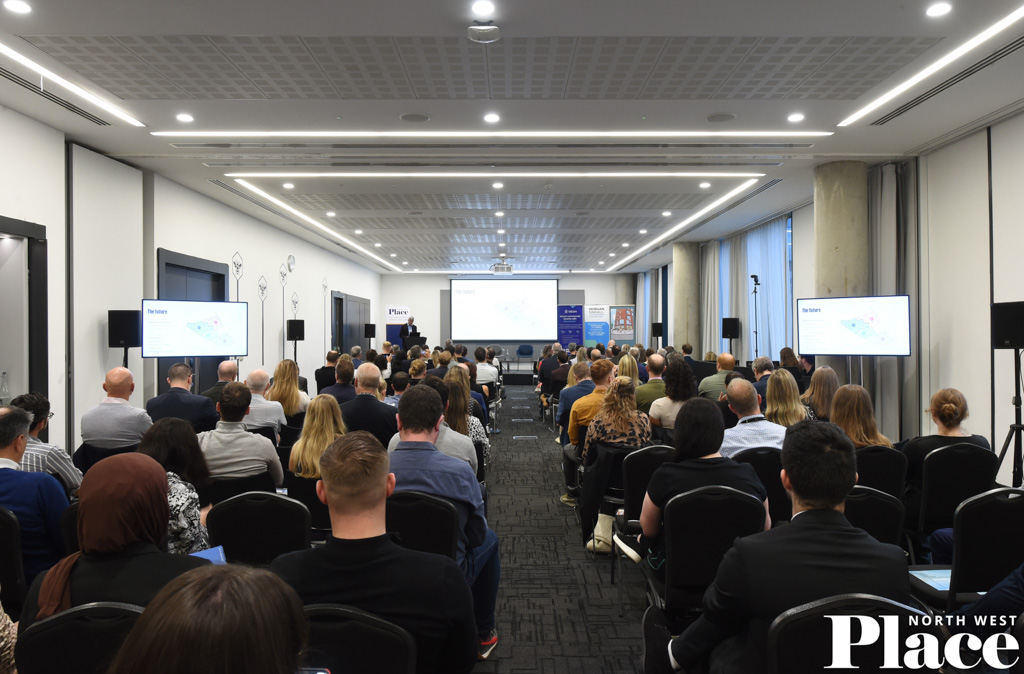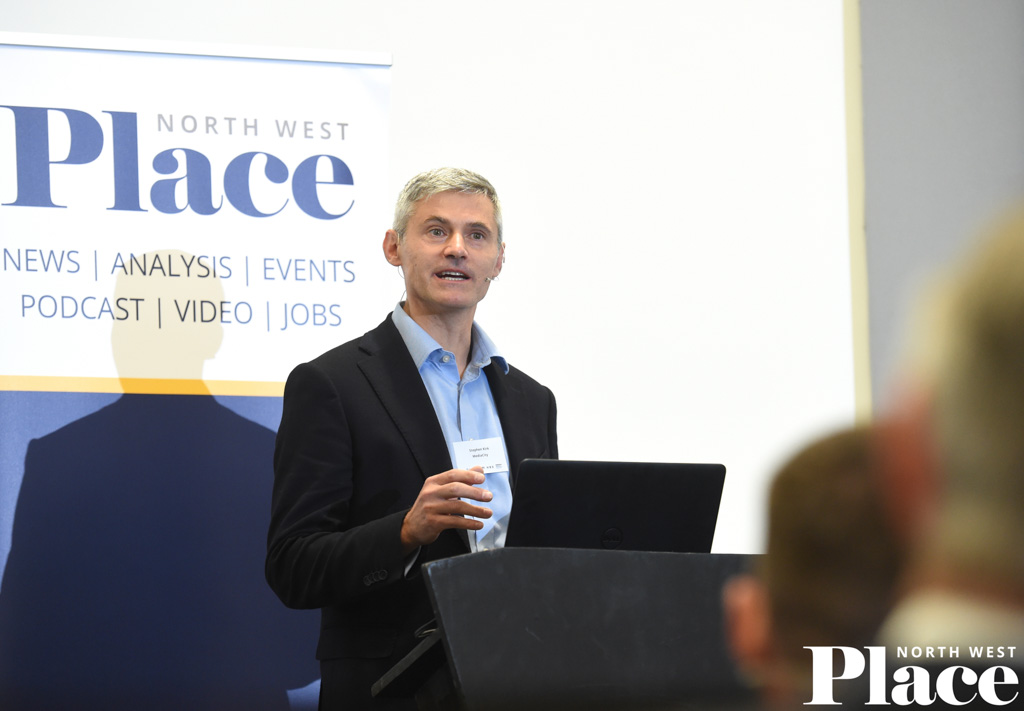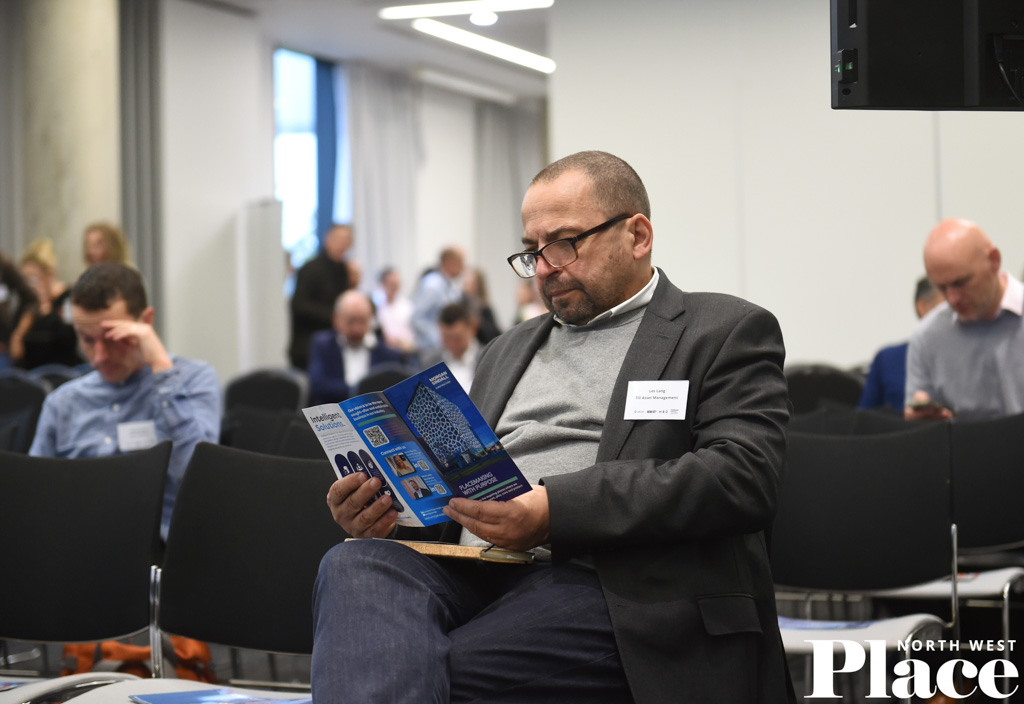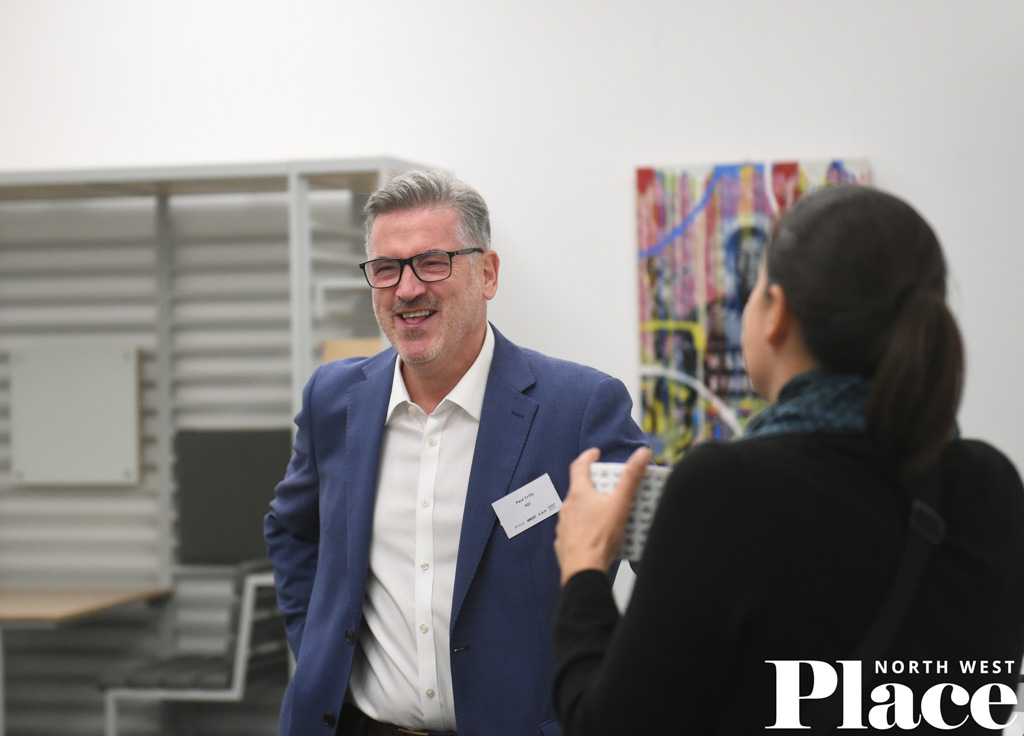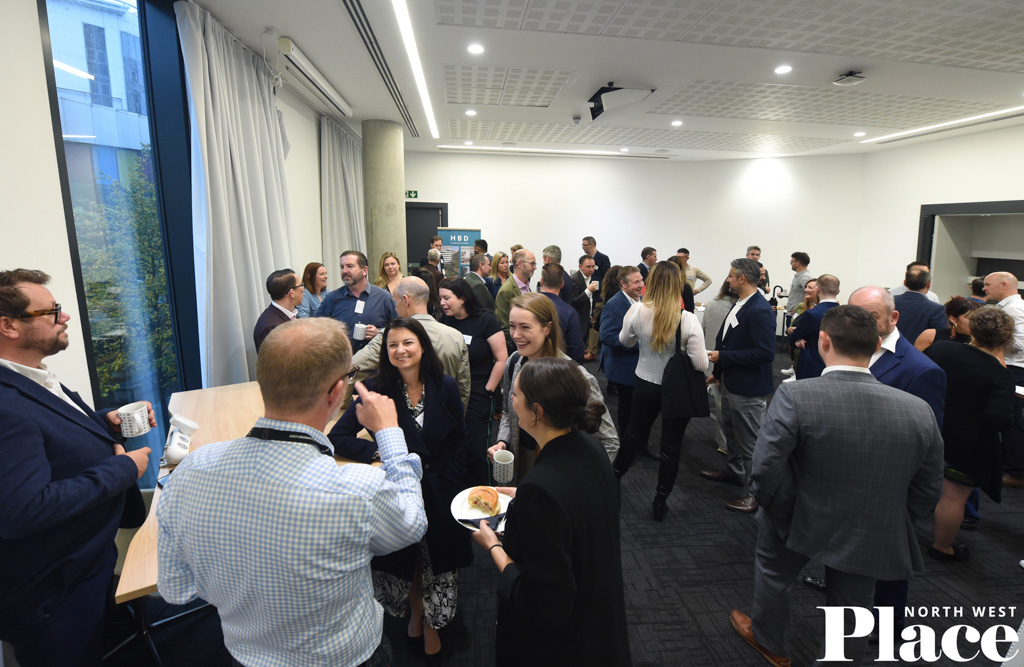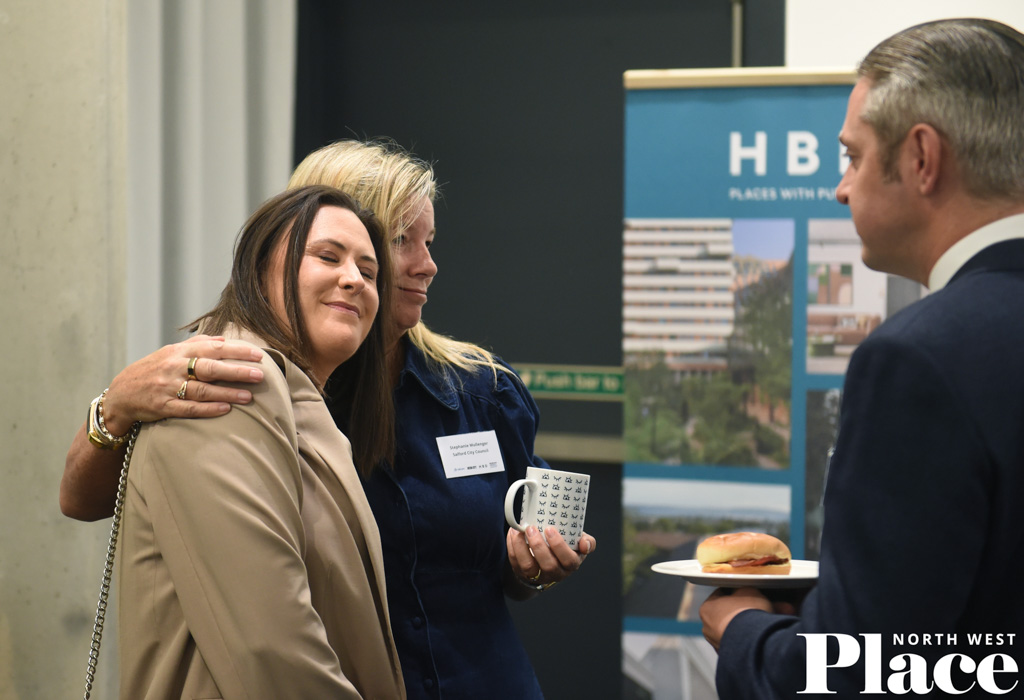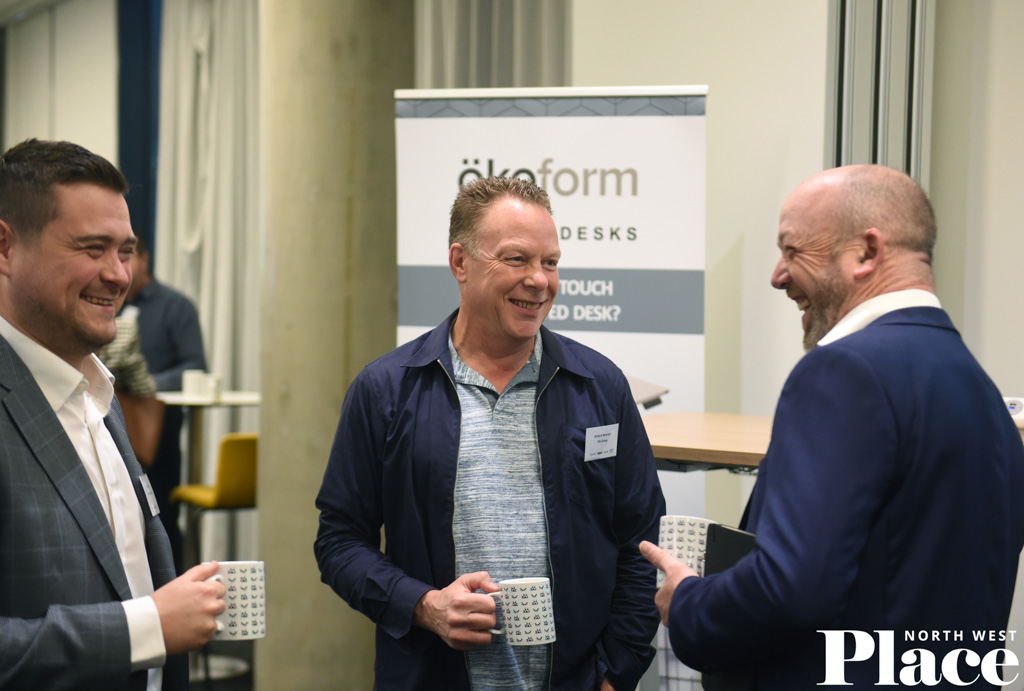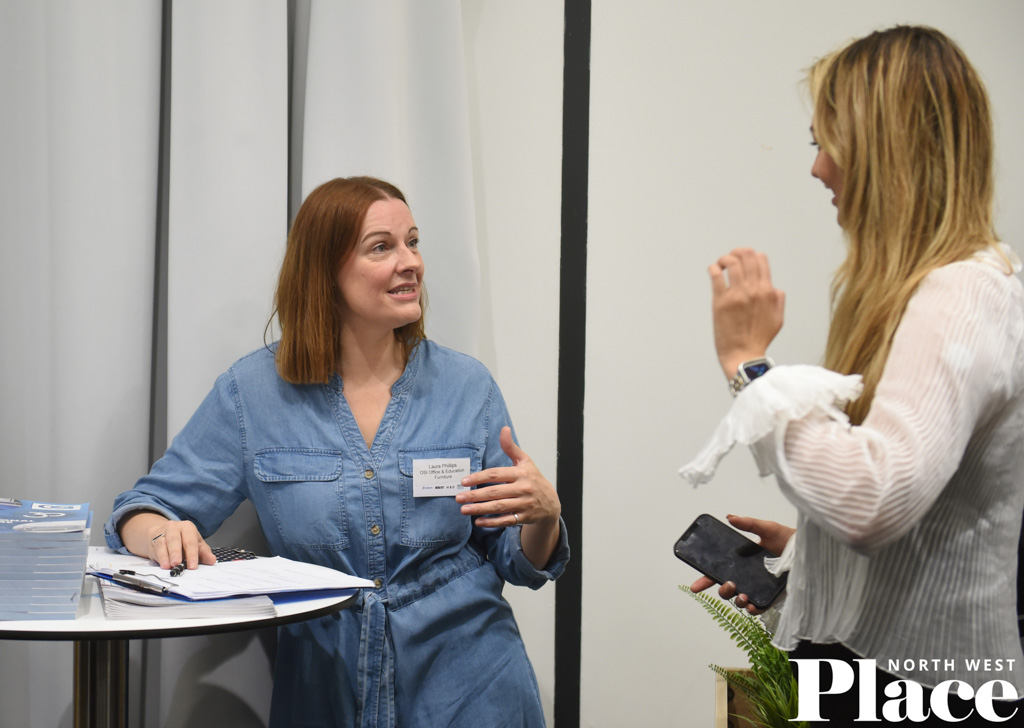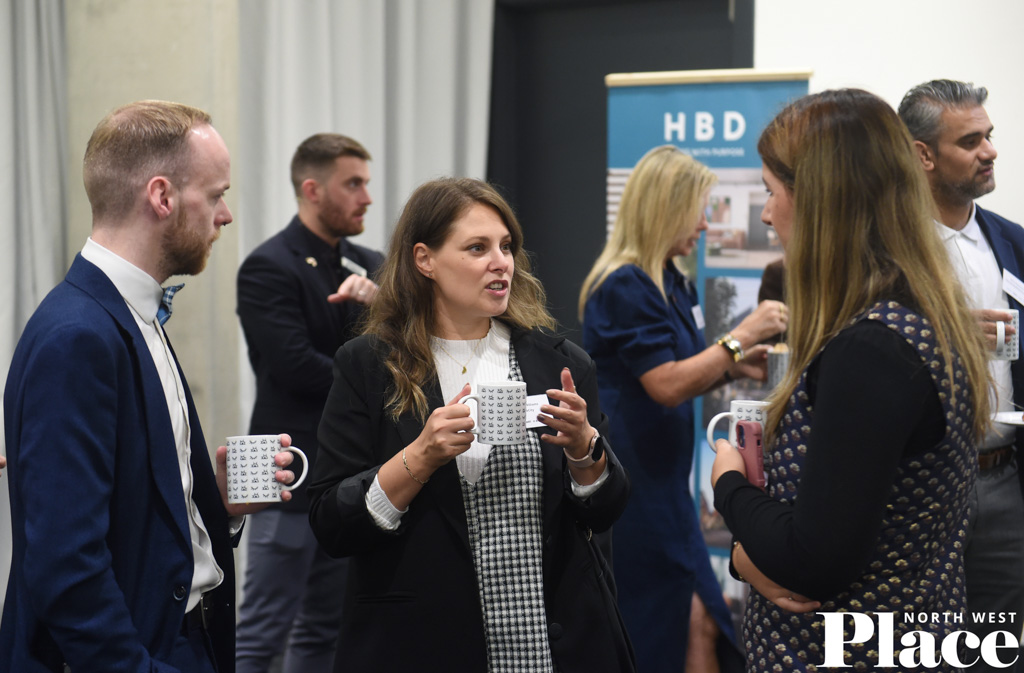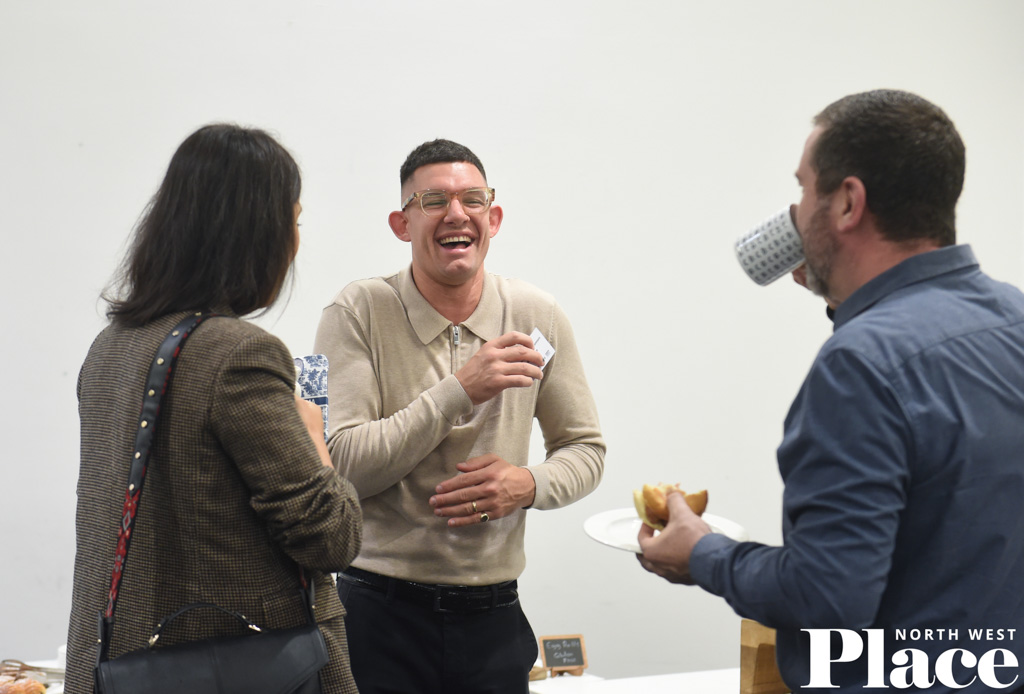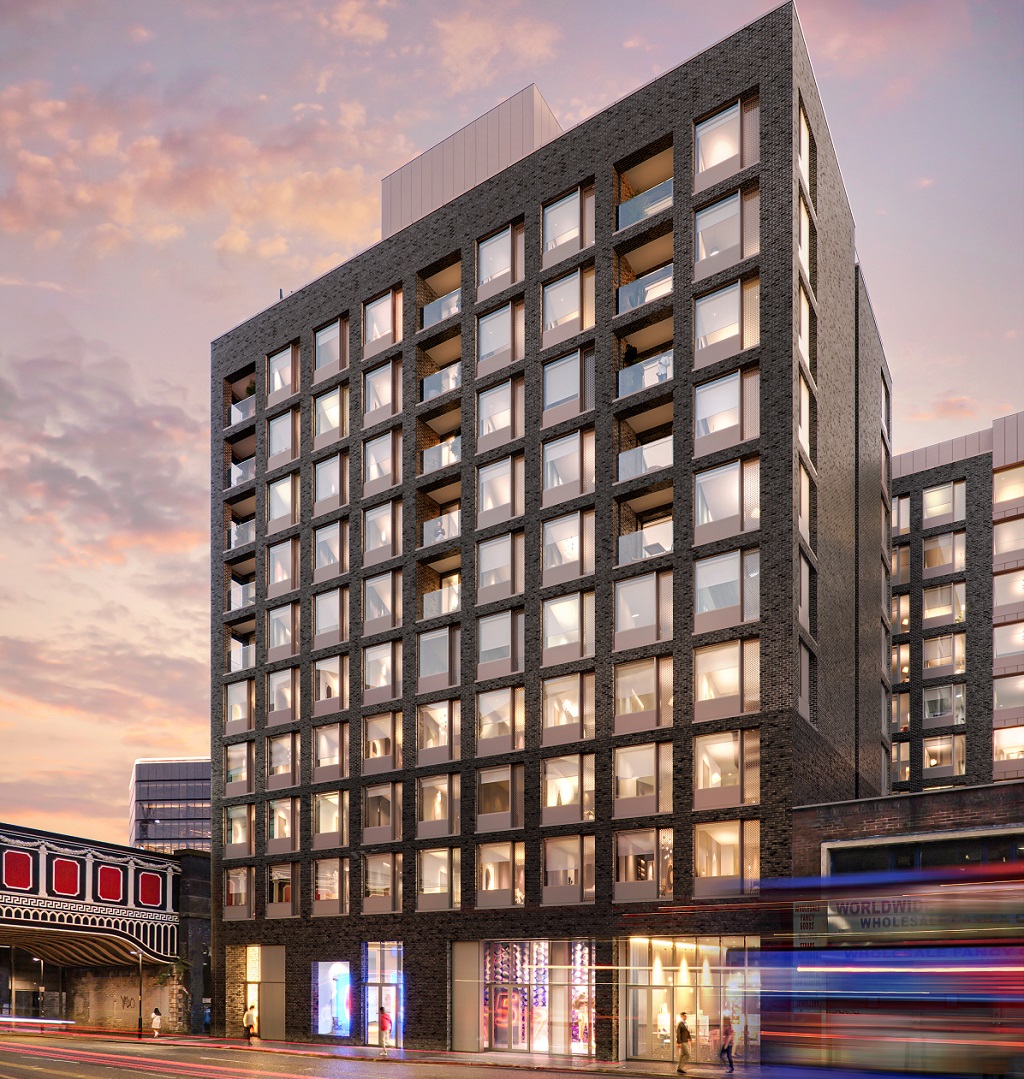Event Summary
Offices + Workspaces | Photos, slides, and summary
“Neck breaking” is the way Place North West senior reporter Dan Whelan described the rate of speed at which workspaces are changing as he introduced the Offices + Workspace Update on Wednesday 11 October. He said there was an intriguing story to tell at a time when companies need offices, but how and when they use them is completely different.
Held at Manchester’s Innside by Melia, the event was sponsored by Telcom, MediaCity, HBD, and Morgan Sindall Construction.
Media marvel
Veteran broadcaster Mark Radcliffe was a virtual guest at the Offices + Workspace event as he provided the voiceover for a MediaCity update. There are four new districts planned, doubling the site in size over the next decade – but without losing the ethos of the development as a place which is “always on, with space to breathe”.
Stephen Kirk, head of asset management for MediaCity, described how there are now 250 tech and media businesses there, as demand has “exploded” since the pandemic, particularly for space in Arrive, the location’s affordable space for startups.
He said these SMEs were making up 7% of the whole site’s population and that they loved the environment because it was more than a workspace, adding: “Conceptually, we have 10% as a realistic ratio.”
“We’ve got the best connectivity outside London,” he said. “It’s a hotbed of innovation and a place where there is always something on. MediaCity isn’t just a cluster of soulless buildings. It’s got a strong sense of place and that hasn’t happened by accident.”
Attracting talent
Whelan asked if Media City’s expansion was a little bullish in the current market. Kirk said: “I don’t see a shortage of demand. We have cool places and nice spaces where we can attract talent.”
Frankie Isherwood, associate director at CBRE, agreed: “It’s a unique proposition. All companies within the same industry, with like-minded people, who will foster collaboration and move things forward. I don’t think there are any drawbacks.”
Oversupply?
Whelan said reports had shown that Manchester is due to see a massive spike in office supply in 2025 and questioned whether the market would be overwhelmed.
David Porter, partner and office head at Knight Frank, thought not. He said: “The reality is that a significant percentage of that is pre-committed.”
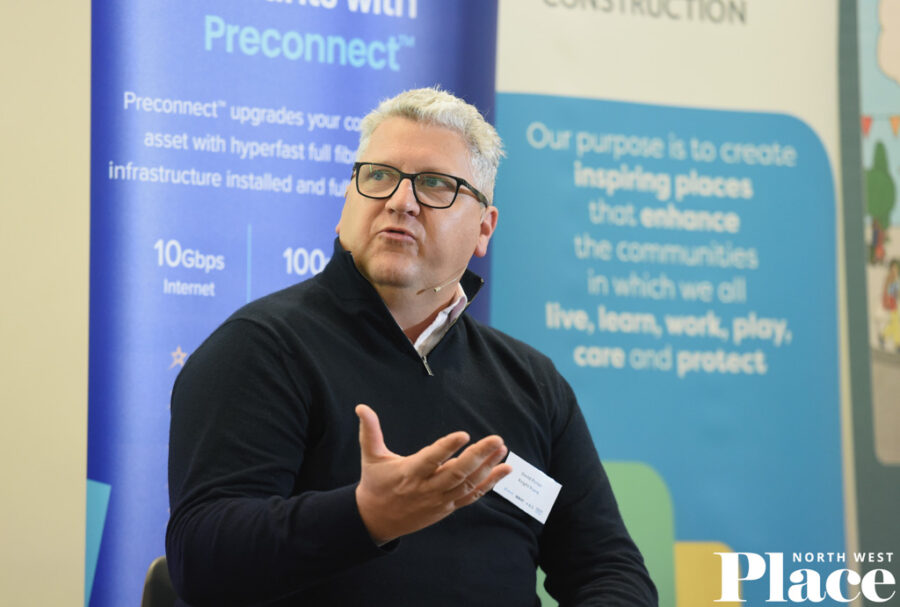
Many of the Manchester offices being constructed today are pre-committed, according to Knight Frank’s David Porter. Credit: PNW
Flexibility is key
Flexibility of space, flexibility of lease, and companies having the ability to grow – these were recurring themes throughout the morning. Kirk said long leases were fine for big corporations who were stable and wanted to be in a specific location, but he added: “People want a lot more flexibility, particularly in a SME space.”
Isherwood said clients wanted flexible operators within their building and were doing things differently – like borrowing a boardroom rather than building one.
Alex Duckett, managing director of Gilbanks, said Manchester was a “natural evolution” when his Leeds-based company was looking for new offices and he said they had to ask the same questions anyone does: “How many businesses truly know how much space they need? Finding flexible space speeds up the decision-making process.”
Jazzmine Barrett, interior design project lead for EPR Architects, said she was seeing an increased demand for spaces which prioritise employees’ wellbeing and events, and the ability to have cross-sector companies in one building. She said: “That’s when true collaboration comes. We create spaces that allow for social and collaborative collisions and that’s how you get community.”
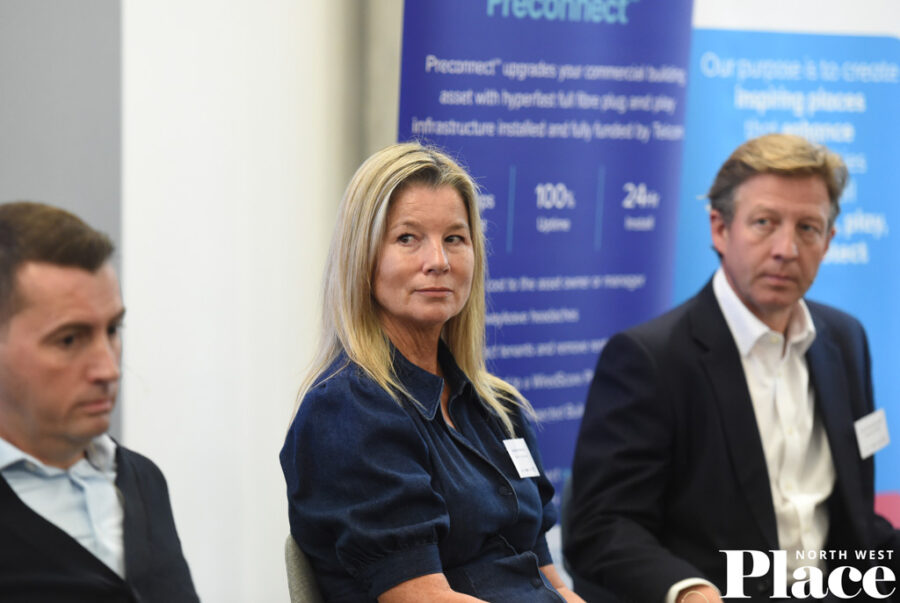
Salford is performing better than Manchester when it comes to the office market, according to Salford City Council’s Stephanie Mullenger. Credit: PNW
Beyond Manchester
Looking to Liverpool and the North West towns, Porter said they were always competing with Manchester. Of Liverpool, he said: “A lot of redundant stock has become residential or hotels and that has stifled growth.”
Meanwhile, Stephanie Mullenger, strategic asset management consultant for Salford City Council, pointed out that Salford was the better-performing city out of Salford and Manchester at the moment. She said this was helped by the availability of very big floor plates and had seen big names like Deloitte, AECOM and Ridge & Partners move from Manchester to Salford’s 100 Embankment.
She said: “The big difference for us was putting a flexible office operator into the building. [Companies] wanted flexible office space and wanted it to reflect their values and their brand.”
Back in business
Getting people back in the office was Isherwood’s clients’ main focus. She said she’d never been asked so many times what the public transport links were like around specific workspaces.
Porter said companies were looking at the type of building and its location in terms of enticing people back in. Kirk added that employees had a part to play: “It [working from home] might be good for you, but is it good for the long-term viability of the business?
“Hybrid working is here to stay but I’m a big believer in having time in the office collaborating.”
Speakers were in agreement that workspaces had to offer the comfort, amenities and atmosphere of home to tempt people back to the office.
Barrett described how she’s created spaces which cater for neurodivergent people, or others with multifaith prayer rooms or mothering suites, and said: “You think about how something looks but you need to tap into the feeling as well. What makes the commute really worth it? These spaces need to be more comfortable and more convenient than your home. Think about the emerging generations and what their priorities are.
“Clients need to be brave. Don’t compromise on design, go for it, but it needs to be futureproofed.”
Using the example of making the lift to the cycle storage match the rest of the décor, Barrett said every room should be taken into account: “We take the whole building into consideration. No one space has a different feeling or experience to the rest of the building.”
Richard Shepherd-Cross, managing director of Custodian Capital, agreed and described the “hotelisation” of office premises and the demand for a higher level of amenity, from covered roof terraces to high-quality changing rooms.
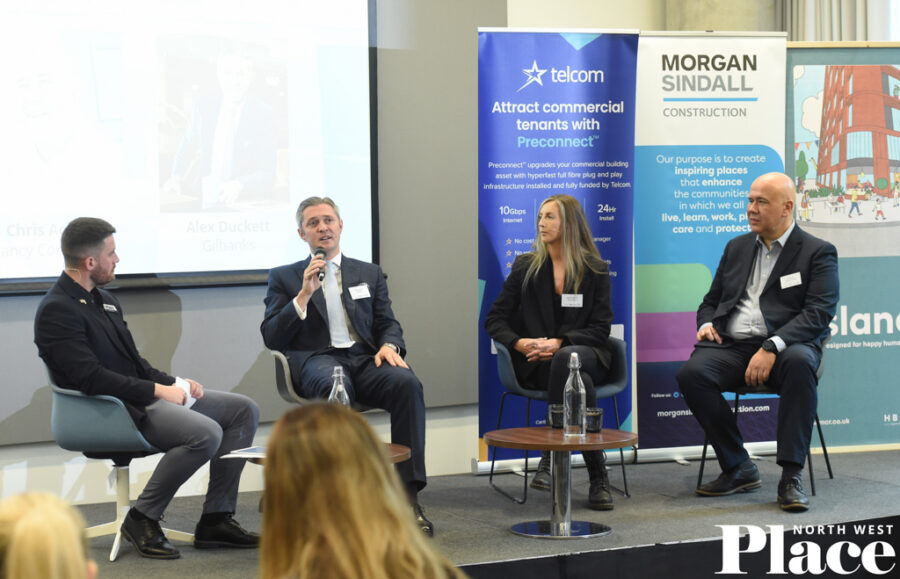
Gilbanks’ Alex Duckett, EPR’s Jazzmine Barrett, and Clancy’s Chris Acton spoke with senior reporter Dan Whelan at Offices + Workspace. Credit: PNW
Location, location, location
Chris Acton, chief executive of Clancy Consulting, moved his company from Altrincham to Manchester because they had simply outgrown the town – there wasn’t any workspace there big enough to accommodate them. Altrincham also had issues for commuters – if they didn’t live on the tram corridor, their only option was to drive. Clancy chose to move to Windmill Green off Manchester’s Mount Street because it ticked some very specific boxes.
“The suburban office market definitely has a place but scalability is going to be a problem for Altrincham,” he said.
“Windmill Green has got a community feel. It’s in the city but on the edge and it’s not hemmed in.
“It has proximity to things like retail and the professional core. It’s about giving people a reason to come into the office,” Acton said.
“Going to work has been vilified and working from home is seen as a privilege. But people make parties. Create an environment where it’s a privilege to go to work. Get a great office and get the right people in it.”
Money – and environmental – matters
The debate turned to finances and Will Lewis, director at OBI Property, said: “Capital values are going down on the basis of yields, but the saving grace is that rents are going up.”
Shepherd-Cross added: “Values go up and down. The value is what other people think a property is worth, not what we think it’s worth to us. Our focus is much more on income. Rents are growing so the income prospects are very strong.
“The sentiment has moved out far too far – people have run like lemmings from office investment and the office market has been oversold so I think there are opportunities,” he continued. “There are also opportunities for refurbishing existing buildings and I hope those who are will get the genuine credit for ESG which is reusing versus knocking down and building.”
Fergus Evans, office portfolio director for Grosvenor, said: “We are not overly worried about value changes year on year. It’s about making the most of the assets that we hold. That’s about improving amenity, really good environmental credentials, and active asset management.”
Sticking with the sustainability theme, Mullenger added: “We need to look at embodied carbon – that’s the bit we are missing out on if we think that shiny new is the best building.”
Whelan asked about inefficient floor-to-ceiling heights in older offices and wondered if we were being creative enough.
Lewis said: “I’ve never seen a trend move so quickly in terms of the drive, or strive, to ESG. Occupiers have to drive the agenda and start valuing the fact it’s a listed building and that’s sustainable in itself. Some buildings aren’t fit for purpose and will be repurposed.
“The biggest danger of an old office building now is the cap ex is very scary,” Lewis continued “It’s not just the refurbishment – it’s the ESG agenda, it’s driving a load of amenity in it, if you want to put fitted-and-furnished in it that’s expensive. Buildings that haven’t been actively asset managed over the last 10 years, there’s going to be some real casualties.”
Evans said watching the outgoings was vital. His company uses software which monitors every piece of kit in the building – that saved them 20% on a £500,000 utility bill in just three months. “You have got to be ruthlessly efficient with your energy,” he said.
Property panic?
Whelan asked whether there was any stress over whether to buy or sell. Lewis said: “Whichever route you take, you have to have a really clear asset plan. What is driving the occupancy market at the moment? It’s service, it’s creating outside space, it’s about a pathway to ESG. To fix obsolescence is expensive. The cap ex plan has got to be right.”
The last word
Asked to predict the future of the office and workspace sector, Lewis said “flexible”, Mullenger added “multifaceted”, Shepherd-Cross said “serviced”, while Evans said “green”.
Slides
What’s next?
Liverpool City Region boasts ambitious sci-tech campuses, a thriving logistics industry, higher education institutions and more, contributing to an economy of £28.3bn. Join Place on Thursday 9 November for Liverpool City Region Development Update, where our panels of experts will talk through the major storylines in the region and debate the best ways to unlock Merseyside’s potential. Book your ticket.
Click any image to launch gallery


